Reflective Learning: Applying Gibbs Model to Feedback Processes
VerifiedAdded on 2023/06/12
|7
|1841
|382
Essay
AI Summary
This essay explores the concept of reflective learning, emphasizing the development of critical thinking skills through experiential learning. It analyzes the Gibbs Reflective Cycle, detailing its six stages: description, feelings, evaluation, analysis, conclusion, and action plan, and how each stage contributes to personal and professional growth. The essay further discusses the importance of feedback and feed-forward processes in enhancing learning and performance, highlighting how these methods, combined with the Gibbs model, enable individuals to assess situations, identify strengths and weaknesses, and develop effective action plans for future challenges. The report concludes that reflective learning, supported by structured models and constructive feedback, is crucial for continuous improvement and success in academic and professional environments. Desklib provides students with access to solved assignments and study tools.
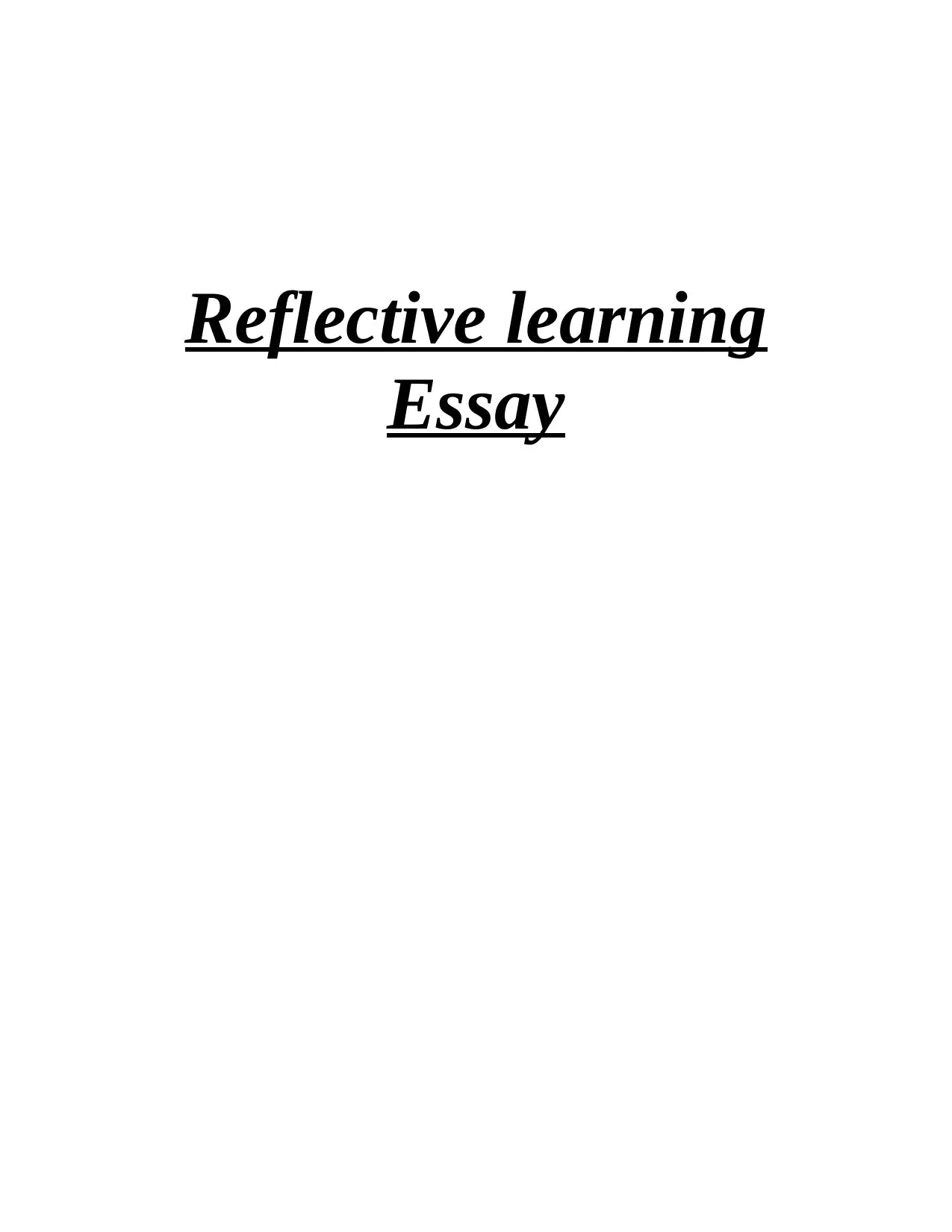
Reflective learning
Essay
Essay
Paraphrase This Document
Need a fresh take? Get an instant paraphrase of this document with our AI Paraphraser
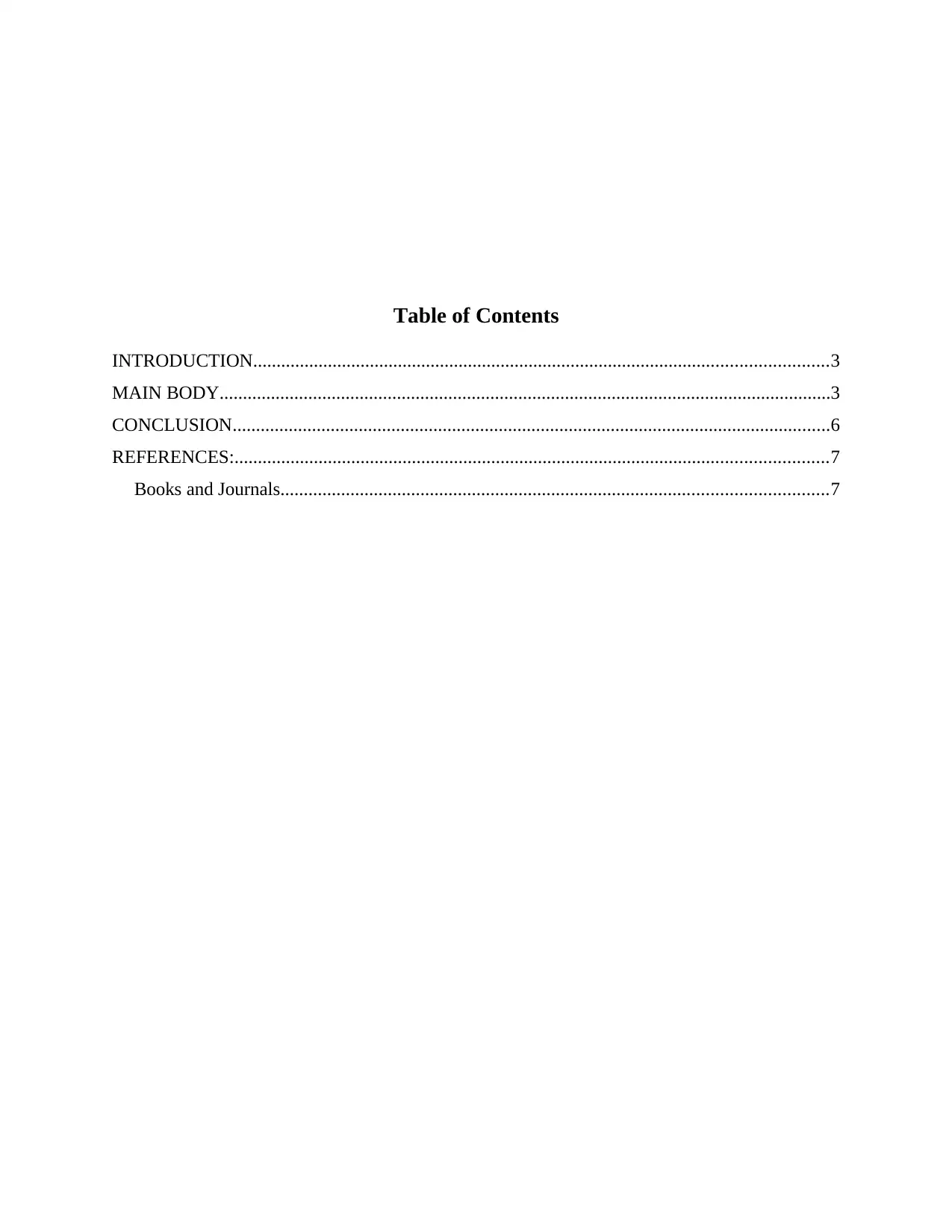
Table of Contents
INTRODUCTION...........................................................................................................................3
MAIN BODY...................................................................................................................................3
CONCLUSION................................................................................................................................6
REFERENCES:...............................................................................................................................7
Books and Journals.....................................................................................................................7
INTRODUCTION...........................................................................................................................3
MAIN BODY...................................................................................................................................3
CONCLUSION................................................................................................................................6
REFERENCES:...............................................................................................................................7
Books and Journals.....................................................................................................................7
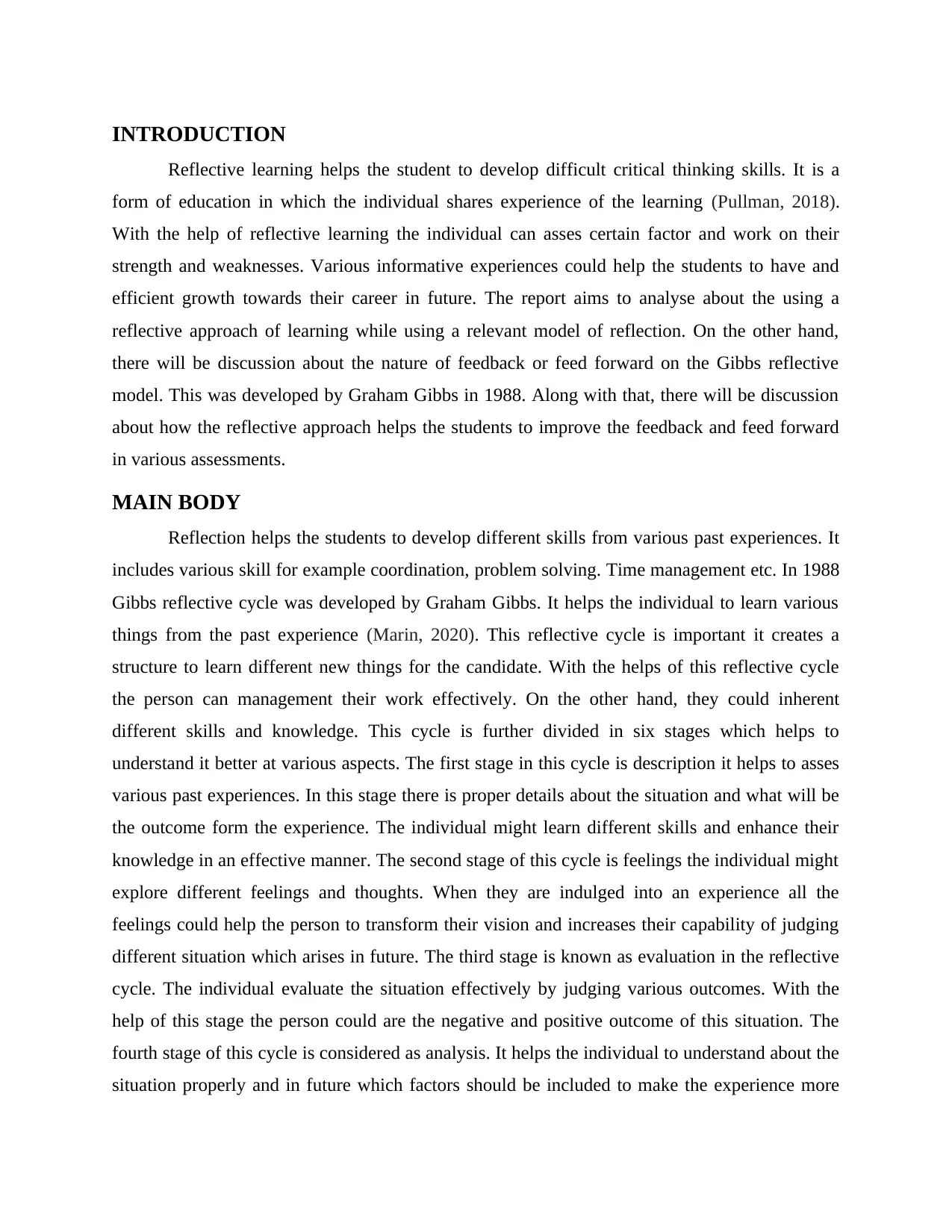
INTRODUCTION
Reflective learning helps the student to develop difficult critical thinking skills. It is a
form of education in which the individual shares experience of the learning (Pullman, 2018).
With the help of reflective learning the individual can asses certain factor and work on their
strength and weaknesses. Various informative experiences could help the students to have and
efficient growth towards their career in future. The report aims to analyse about the using a
reflective approach of learning while using a relevant model of reflection. On the other hand,
there will be discussion about the nature of feedback or feed forward on the Gibbs reflective
model. This was developed by Graham Gibbs in 1988. Along with that, there will be discussion
about how the reflective approach helps the students to improve the feedback and feed forward
in various assessments.
MAIN BODY
Reflection helps the students to develop different skills from various past experiences. It
includes various skill for example coordination, problem solving. Time management etc. In 1988
Gibbs reflective cycle was developed by Graham Gibbs. It helps the individual to learn various
things from the past experience (Marin, 2020). This reflective cycle is important it creates a
structure to learn different new things for the candidate. With the helps of this reflective cycle
the person can management their work effectively. On the other hand, they could inherent
different skills and knowledge. This cycle is further divided in six stages which helps to
understand it better at various aspects. The first stage in this cycle is description it helps to asses
various past experiences. In this stage there is proper details about the situation and what will be
the outcome form the experience. The individual might learn different skills and enhance their
knowledge in an effective manner. The second stage of this cycle is feelings the individual might
explore different feelings and thoughts. When they are indulged into an experience all the
feelings could help the person to transform their vision and increases their capability of judging
different situation which arises in future. The third stage is known as evaluation in the reflective
cycle. The individual evaluate the situation effectively by judging various outcomes. With the
help of this stage the person could are the negative and positive outcome of this situation. The
fourth stage of this cycle is considered as analysis. It helps the individual to understand about the
situation properly and in future which factors should be included to make the experience more
Reflective learning helps the student to develop difficult critical thinking skills. It is a
form of education in which the individual shares experience of the learning (Pullman, 2018).
With the help of reflective learning the individual can asses certain factor and work on their
strength and weaknesses. Various informative experiences could help the students to have and
efficient growth towards their career in future. The report aims to analyse about the using a
reflective approach of learning while using a relevant model of reflection. On the other hand,
there will be discussion about the nature of feedback or feed forward on the Gibbs reflective
model. This was developed by Graham Gibbs in 1988. Along with that, there will be discussion
about how the reflective approach helps the students to improve the feedback and feed forward
in various assessments.
MAIN BODY
Reflection helps the students to develop different skills from various past experiences. It
includes various skill for example coordination, problem solving. Time management etc. In 1988
Gibbs reflective cycle was developed by Graham Gibbs. It helps the individual to learn various
things from the past experience (Marin, 2020). This reflective cycle is important it creates a
structure to learn different new things for the candidate. With the helps of this reflective cycle
the person can management their work effectively. On the other hand, they could inherent
different skills and knowledge. This cycle is further divided in six stages which helps to
understand it better at various aspects. The first stage in this cycle is description it helps to asses
various past experiences. In this stage there is proper details about the situation and what will be
the outcome form the experience. The individual might learn different skills and enhance their
knowledge in an effective manner. The second stage of this cycle is feelings the individual might
explore different feelings and thoughts. When they are indulged into an experience all the
feelings could help the person to transform their vision and increases their capability of judging
different situation which arises in future. The third stage is known as evaluation in the reflective
cycle. The individual evaluate the situation effectively by judging various outcomes. With the
help of this stage the person could are the negative and positive outcome of this situation. The
fourth stage of this cycle is considered as analysis. It helps the individual to understand about the
situation properly and in future which factors should be included to make the experience more
⊘ This is a preview!⊘
Do you want full access?
Subscribe today to unlock all pages.

Trusted by 1+ million students worldwide
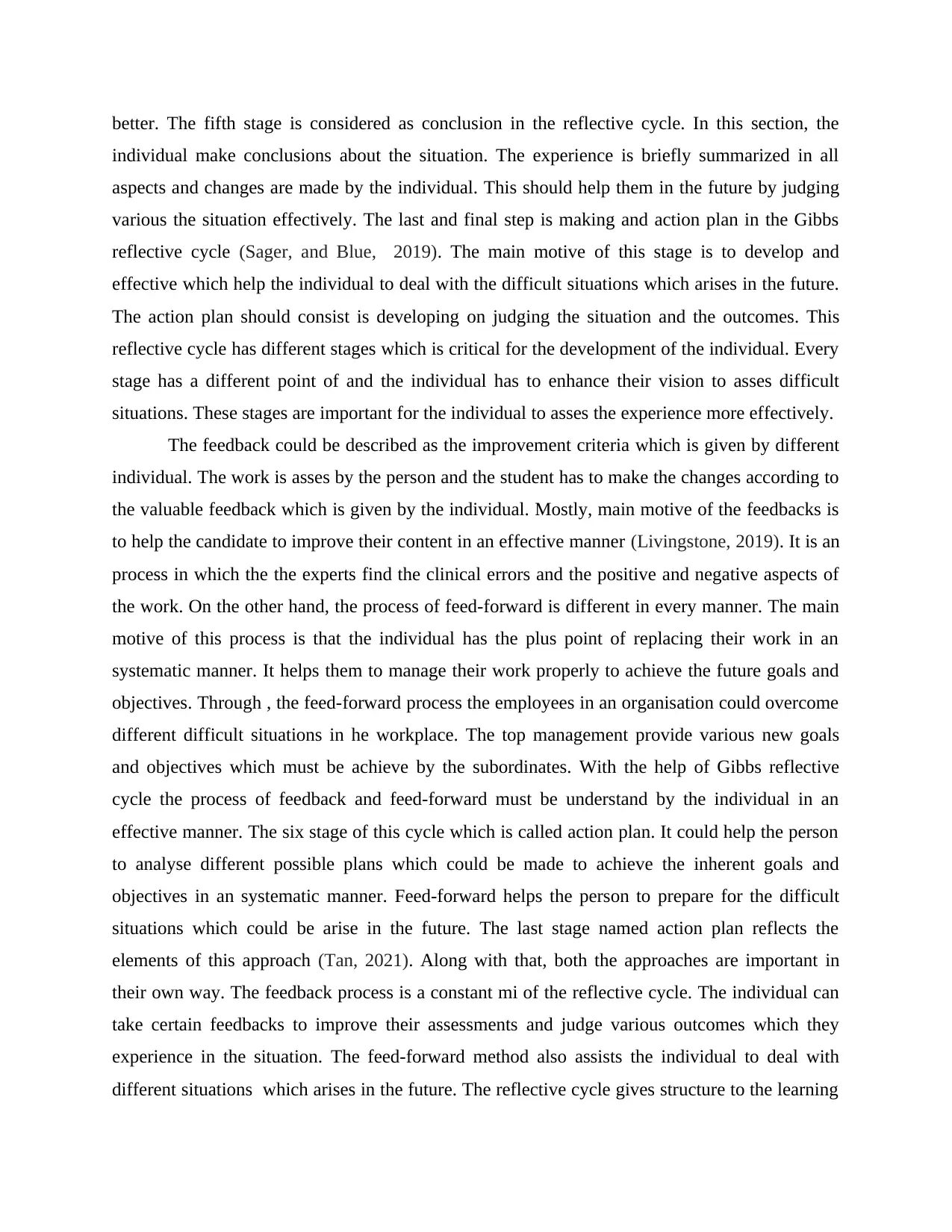
better. The fifth stage is considered as conclusion in the reflective cycle. In this section, the
individual make conclusions about the situation. The experience is briefly summarized in all
aspects and changes are made by the individual. This should help them in the future by judging
various the situation effectively. The last and final step is making and action plan in the Gibbs
reflective cycle (Sager, and Blue, 2019). The main motive of this stage is to develop and
effective which help the individual to deal with the difficult situations which arises in the future.
The action plan should consist is developing on judging the situation and the outcomes. This
reflective cycle has different stages which is critical for the development of the individual. Every
stage has a different point of and the individual has to enhance their vision to asses difficult
situations. These stages are important for the individual to asses the experience more effectively.
The feedback could be described as the improvement criteria which is given by different
individual. The work is asses by the person and the student has to make the changes according to
the valuable feedback which is given by the individual. Mostly, main motive of the feedbacks is
to help the candidate to improve their content in an effective manner (Livingstone, 2019). It is an
process in which the the experts find the clinical errors and the positive and negative aspects of
the work. On the other hand, the process of feed-forward is different in every manner. The main
motive of this process is that the individual has the plus point of replacing their work in an
systematic manner. It helps them to manage their work properly to achieve the future goals and
objectives. Through , the feed-forward process the employees in an organisation could overcome
different difficult situations in he workplace. The top management provide various new goals
and objectives which must be achieve by the subordinates. With the help of Gibbs reflective
cycle the process of feedback and feed-forward must be understand by the individual in an
effective manner. The six stage of this cycle which is called action plan. It could help the person
to analyse different possible plans which could be made to achieve the inherent goals and
objectives in an systematic manner. Feed-forward helps the person to prepare for the difficult
situations which could be arise in the future. The last stage named action plan reflects the
elements of this approach (Tan, 2021). Along with that, both the approaches are important in
their own way. The feedback process is a constant mi of the reflective cycle. The individual can
take certain feedbacks to improve their assessments and judge various outcomes which they
experience in the situation. The feed-forward method also assists the individual to deal with
different situations which arises in the future. The reflective cycle gives structure to the learning
individual make conclusions about the situation. The experience is briefly summarized in all
aspects and changes are made by the individual. This should help them in the future by judging
various the situation effectively. The last and final step is making and action plan in the Gibbs
reflective cycle (Sager, and Blue, 2019). The main motive of this stage is to develop and
effective which help the individual to deal with the difficult situations which arises in the future.
The action plan should consist is developing on judging the situation and the outcomes. This
reflective cycle has different stages which is critical for the development of the individual. Every
stage has a different point of and the individual has to enhance their vision to asses difficult
situations. These stages are important for the individual to asses the experience more effectively.
The feedback could be described as the improvement criteria which is given by different
individual. The work is asses by the person and the student has to make the changes according to
the valuable feedback which is given by the individual. Mostly, main motive of the feedbacks is
to help the candidate to improve their content in an effective manner (Livingstone, 2019). It is an
process in which the the experts find the clinical errors and the positive and negative aspects of
the work. On the other hand, the process of feed-forward is different in every manner. The main
motive of this process is that the individual has the plus point of replacing their work in an
systematic manner. It helps them to manage their work properly to achieve the future goals and
objectives. Through , the feed-forward process the employees in an organisation could overcome
different difficult situations in he workplace. The top management provide various new goals
and objectives which must be achieve by the subordinates. With the help of Gibbs reflective
cycle the process of feedback and feed-forward must be understand by the individual in an
effective manner. The six stage of this cycle which is called action plan. It could help the person
to analyse different possible plans which could be made to achieve the inherent goals and
objectives in an systematic manner. Feed-forward helps the person to prepare for the difficult
situations which could be arise in the future. The last stage named action plan reflects the
elements of this approach (Tan, 2021). Along with that, both the approaches are important in
their own way. The feedback process is a constant mi of the reflective cycle. The individual can
take certain feedbacks to improve their assessments and judge various outcomes which they
experience in the situation. The feed-forward method also assists the individual to deal with
different situations which arises in the future. The reflective cycle gives structure to the learning
Paraphrase This Document
Need a fresh take? Get an instant paraphrase of this document with our AI Paraphraser
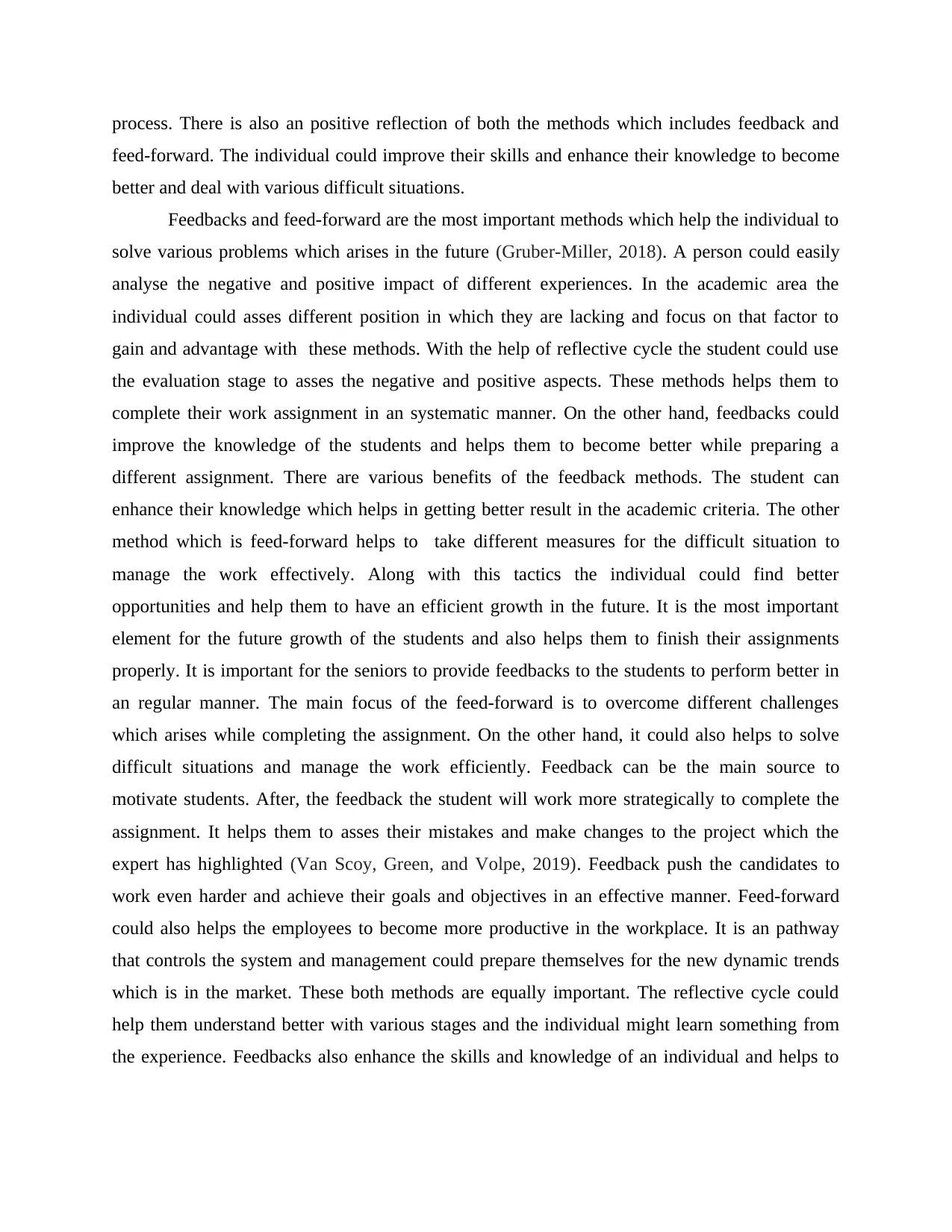
process. There is also an positive reflection of both the methods which includes feedback and
feed-forward. The individual could improve their skills and enhance their knowledge to become
better and deal with various difficult situations.
Feedbacks and feed-forward are the most important methods which help the individual to
solve various problems which arises in the future (Gruber-Miller, 2018). A person could easily
analyse the negative and positive impact of different experiences. In the academic area the
individual could asses different position in which they are lacking and focus on that factor to
gain and advantage with these methods. With the help of reflective cycle the student could use
the evaluation stage to asses the negative and positive aspects. These methods helps them to
complete their work assignment in an systematic manner. On the other hand, feedbacks could
improve the knowledge of the students and helps them to become better while preparing a
different assignment. There are various benefits of the feedback methods. The student can
enhance their knowledge which helps in getting better result in the academic criteria. The other
method which is feed-forward helps to take different measures for the difficult situation to
manage the work effectively. Along with this tactics the individual could find better
opportunities and help them to have an efficient growth in the future. It is the most important
element for the future growth of the students and also helps them to finish their assignments
properly. It is important for the seniors to provide feedbacks to the students to perform better in
an regular manner. The main focus of the feed-forward is to overcome different challenges
which arises while completing the assignment. On the other hand, it could also helps to solve
difficult situations and manage the work efficiently. Feedback can be the main source to
motivate students. After, the feedback the student will work more strategically to complete the
assignment. It helps them to asses their mistakes and make changes to the project which the
expert has highlighted (Van Scoy, Green, and Volpe, 2019). Feedback push the candidates to
work even harder and achieve their goals and objectives in an effective manner. Feed-forward
could also helps the employees to become more productive in the workplace. It is an pathway
that controls the system and management could prepare themselves for the new dynamic trends
which is in the market. These both methods are equally important. The reflective cycle could
help them understand better with various stages and the individual might learn something from
the experience. Feedbacks also enhance the skills and knowledge of an individual and helps to
feed-forward. The individual could improve their skills and enhance their knowledge to become
better and deal with various difficult situations.
Feedbacks and feed-forward are the most important methods which help the individual to
solve various problems which arises in the future (Gruber-Miller, 2018). A person could easily
analyse the negative and positive impact of different experiences. In the academic area the
individual could asses different position in which they are lacking and focus on that factor to
gain and advantage with these methods. With the help of reflective cycle the student could use
the evaluation stage to asses the negative and positive aspects. These methods helps them to
complete their work assignment in an systematic manner. On the other hand, feedbacks could
improve the knowledge of the students and helps them to become better while preparing a
different assignment. There are various benefits of the feedback methods. The student can
enhance their knowledge which helps in getting better result in the academic criteria. The other
method which is feed-forward helps to take different measures for the difficult situation to
manage the work effectively. Along with this tactics the individual could find better
opportunities and help them to have an efficient growth in the future. It is the most important
element for the future growth of the students and also helps them to finish their assignments
properly. It is important for the seniors to provide feedbacks to the students to perform better in
an regular manner. The main focus of the feed-forward is to overcome different challenges
which arises while completing the assignment. On the other hand, it could also helps to solve
difficult situations and manage the work efficiently. Feedback can be the main source to
motivate students. After, the feedback the student will work more strategically to complete the
assignment. It helps them to asses their mistakes and make changes to the project which the
expert has highlighted (Van Scoy, Green, and Volpe, 2019). Feedback push the candidates to
work even harder and achieve their goals and objectives in an effective manner. Feed-forward
could also helps the employees to become more productive in the workplace. It is an pathway
that controls the system and management could prepare themselves for the new dynamic trends
which is in the market. These both methods are equally important. The reflective cycle could
help them understand better with various stages and the individual might learn something from
the experience. Feedbacks also enhance the skills and knowledge of an individual and helps to
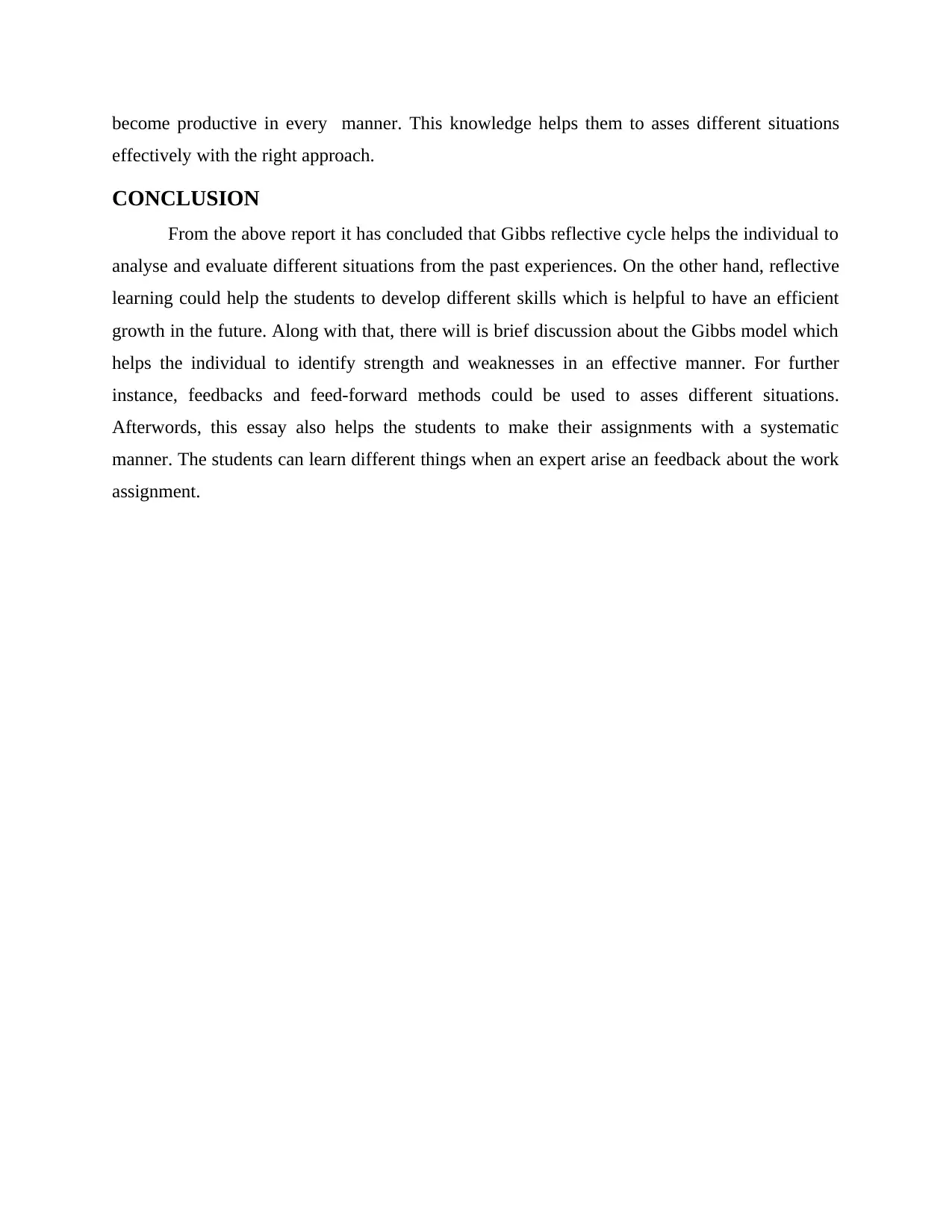
become productive in every manner. This knowledge helps them to asses different situations
effectively with the right approach.
CONCLUSION
From the above report it has concluded that Gibbs reflective cycle helps the individual to
analyse and evaluate different situations from the past experiences. On the other hand, reflective
learning could help the students to develop different skills which is helpful to have an efficient
growth in the future. Along with that, there will is brief discussion about the Gibbs model which
helps the individual to identify strength and weaknesses in an effective manner. For further
instance, feedbacks and feed-forward methods could be used to asses different situations.
Afterwords, this essay also helps the students to make their assignments with a systematic
manner. The students can learn different things when an expert arise an feedback about the work
assignment.
effectively with the right approach.
CONCLUSION
From the above report it has concluded that Gibbs reflective cycle helps the individual to
analyse and evaluate different situations from the past experiences. On the other hand, reflective
learning could help the students to develop different skills which is helpful to have an efficient
growth in the future. Along with that, there will is brief discussion about the Gibbs model which
helps the individual to identify strength and weaknesses in an effective manner. For further
instance, feedbacks and feed-forward methods could be used to asses different situations.
Afterwords, this essay also helps the students to make their assignments with a systematic
manner. The students can learn different things when an expert arise an feedback about the work
assignment.
⊘ This is a preview!⊘
Do you want full access?
Subscribe today to unlock all pages.

Trusted by 1+ million students worldwide
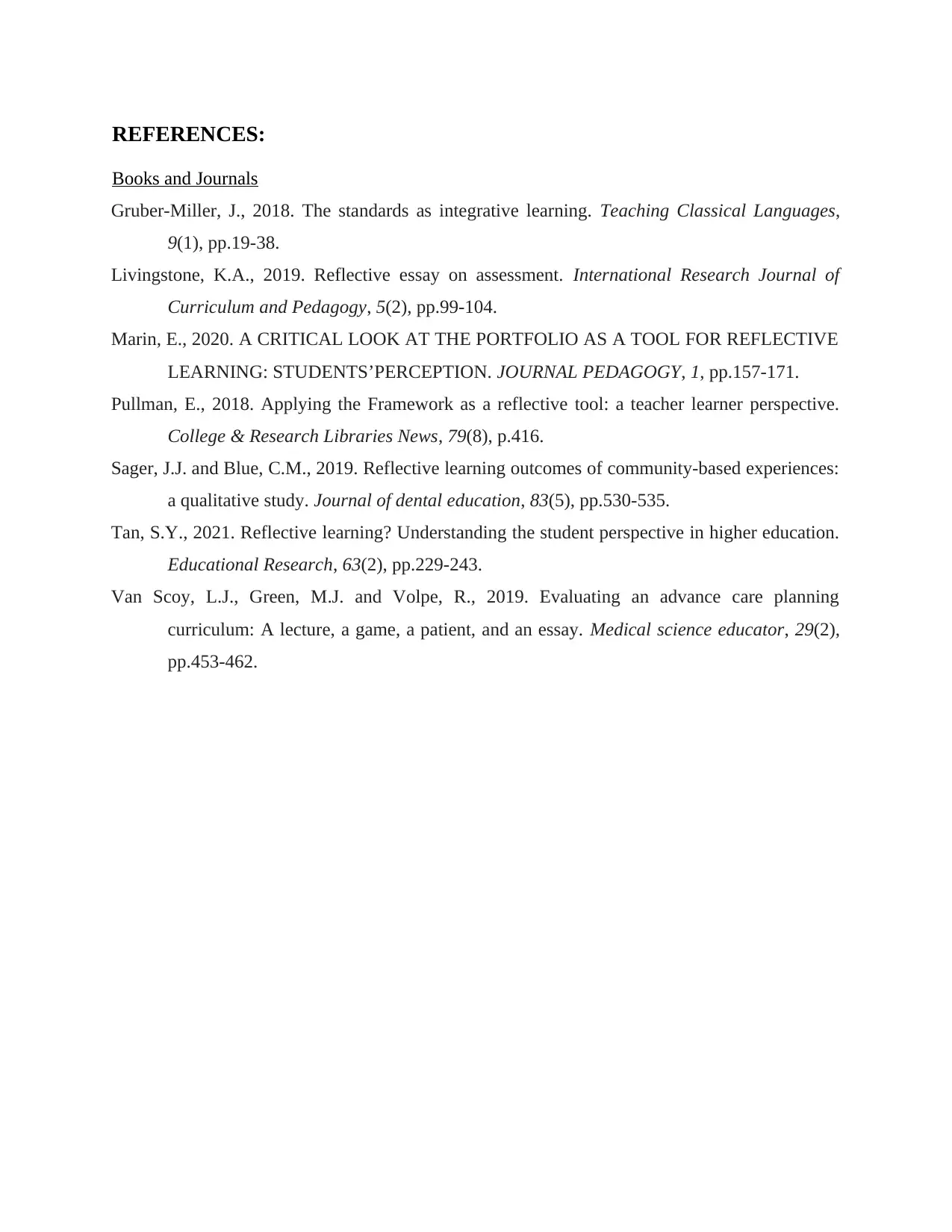
REFERENCES:
Books and Journals
Gruber-Miller, J., 2018. The standards as integrative learning. Teaching Classical Languages,
9(1), pp.19-38.
Livingstone, K.A., 2019. Reflective essay on assessment. International Research Journal of
Curriculum and Pedagogy, 5(2), pp.99-104.
Marin, E., 2020. A CRITICAL LOOK AT THE PORTFOLIO AS A TOOL FOR REFLECTIVE
LEARNING: STUDENTS’PERCEPTION. JOURNAL PEDAGOGY, 1, pp.157-171.
Pullman, E., 2018. Applying the Framework as a reflective tool: a teacher learner perspective.
College & Research Libraries News, 79(8), p.416.
Sager, J.J. and Blue, C.M., 2019. Reflective learning outcomes of community‐based experiences:
a qualitative study. Journal of dental education, 83(5), pp.530-535.
Tan, S.Y., 2021. Reflective learning? Understanding the student perspective in higher education.
Educational Research, 63(2), pp.229-243.
Van Scoy, L.J., Green, M.J. and Volpe, R., 2019. Evaluating an advance care planning
curriculum: A lecture, a game, a patient, and an essay. Medical science educator, 29(2),
pp.453-462.
Books and Journals
Gruber-Miller, J., 2018. The standards as integrative learning. Teaching Classical Languages,
9(1), pp.19-38.
Livingstone, K.A., 2019. Reflective essay on assessment. International Research Journal of
Curriculum and Pedagogy, 5(2), pp.99-104.
Marin, E., 2020. A CRITICAL LOOK AT THE PORTFOLIO AS A TOOL FOR REFLECTIVE
LEARNING: STUDENTS’PERCEPTION. JOURNAL PEDAGOGY, 1, pp.157-171.
Pullman, E., 2018. Applying the Framework as a reflective tool: a teacher learner perspective.
College & Research Libraries News, 79(8), p.416.
Sager, J.J. and Blue, C.M., 2019. Reflective learning outcomes of community‐based experiences:
a qualitative study. Journal of dental education, 83(5), pp.530-535.
Tan, S.Y., 2021. Reflective learning? Understanding the student perspective in higher education.
Educational Research, 63(2), pp.229-243.
Van Scoy, L.J., Green, M.J. and Volpe, R., 2019. Evaluating an advance care planning
curriculum: A lecture, a game, a patient, and an essay. Medical science educator, 29(2),
pp.453-462.
1 out of 7
Related Documents
Your All-in-One AI-Powered Toolkit for Academic Success.
+13062052269
info@desklib.com
Available 24*7 on WhatsApp / Email
![[object Object]](/_next/static/media/star-bottom.7253800d.svg)
Unlock your academic potential
Copyright © 2020–2026 A2Z Services. All Rights Reserved. Developed and managed by ZUCOL.
